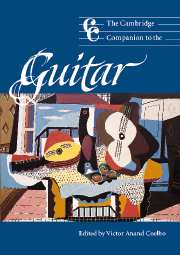Book contents
- Frontmatter
- Part I New guitar histories and world traditions
- 1 Picking through cultures: a guitarist's music history
- 2 Flamenco guitar: history, style, status
- 3 The Celtic guitar: crossing cultural boundaries in the twentieth century
- 4 African reinventions of the guitar
- Part II Jazz, roots, and rock
- Part III Baroque and classical guitar today
- Glossary
- Notes
- Select bibliography
- General index
- Index of song and album titles
4 - African reinventions of the guitar
from Part I - New guitar histories and world traditions
Published online by Cambridge University Press: 28 September 2011
- Frontmatter
- Part I New guitar histories and world traditions
- 1 Picking through cultures: a guitarist's music history
- 2 Flamenco guitar: history, style, status
- 3 The Celtic guitar: crossing cultural boundaries in the twentieth century
- 4 African reinventions of the guitar
- Part II Jazz, roots, and rock
- Part III Baroque and classical guitar today
- Glossary
- Notes
- Select bibliography
- General index
- Index of song and album titles
Summary
Africa has nurtured a surprising array of modern and neo-traditional guitar styles. Portable, rugged, versatile, and relatively easy to construct, the guitar has thrived in African settings to the point where today it is among the most pervasive instruments continent-wide, second only to the drum. In places like Mali and Madagascar, ancient instrumental traditions have inspired distinctive acoustic guitar finger-picking techniques. Elsewhere – in Zimbabwe, Guinea, and Cameroon, for example – pre-guitar traditions have evolved into guitar-based, electric “afropop,” once again engendering techniques and sounds unique in world music. In Congo in the 1950s, bands trying to play Cuban dance music substituted the handy guitar for the more rare piano, and within a few years, they developed a highly influential method of layering multiple electric guitar lines. Looking at the range and diversity of guitar innovations in Africa, one could argue that only rock and roll has so revolutionized the instrument over the course of the twentieth century. African guitarists are now beginning to earn widespread recognition, and their work is sure to have further impact around the world in years to come.
Consider these recent developments. Paul Simon drew upon guitarists Ray Phiri of South Africa and Vincent Nguini of Cameroon while creating the music for his Grammy Award-winning Graceland project. Ry Cooder also won a Grammy Award in 1994 for his collaboration with northern Malian guitarist Ali Farka Touré,TalkingTimbuktu (WorldCircuit/Rykodisc 1994). That release focused attention on the connections between blues and Malian music and opened the door for other “Malian bluesmen,” such as guitarist and singer Lobi Traoré.
- Type
- Chapter
- Information
- The Cambridge Companion to the Guitar , pp. 44 - 64Publisher: Cambridge University PressPrint publication year: 2003
- 1
- Cited by

